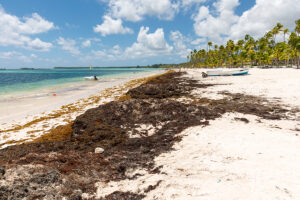Barbados biomass project powers cars with sargassum

In 2011, huge amounts of the seaweed entered Caribbean beaches - bringing a pungent odour as it rotted.
Seven years later, Barbados' prime minister Mia Mottley said sargussum was a national emergency.
The scientists recently launched one of the world's first vehicles fuelled by bio-compressed natural gas.
As well as sargassum, the fuel source - created at Barbados' University of the West Indies - utilises wastewater from local rum distilleries, and excrement from the island's blackbelly sheep. The latter provides the anaerobic bacteria.
According to the team, any car can be converted to run on the gas via a simple four-hour installation process, at a total cost of around $2,500 (£1,940).
Dr Legena Henry explained there is no shortage of sargassum to power cars.
“Tourism has suffered a lot from the seaweed; hotels have been spending millions on tackling it. It’s caused a crisis,” said Dr Henry.
The academic credited Brittney McKenzie, one of her students, as coming up with the idea. McKenzie had observed the volume of trucks deployed to transport sargassum from Barbados' beaches.
“We’d just spent three weeks researching sugarcane. But I looked at Brittney’s face and she was so excited, I couldn’t break her heart,” said Dr Henry.
“We already had rum distillery waste water so we decided to put that with sargassum and see what happened.”
Brittney was tasked with collecting seaweed from beaches and setting up small scale bioreactors to conduct preliminary research.
“Within just two weeks we got pretty good results,” Brittney told the BBC. “It was turning into something even bigger than we initially thought.”
The team filed a patent on their formula and, in 2019, presented their project to potential investors during a side meeting at the UN General Assembly in New York.
Biologist Shamika Spencer was hired to experiment with differing amounts of sargassum and waste water to figure out which combination produced the most biogas.
Watching the successful test drive of a biogas-charged Nissan Leaf – supplied by the Caribbean Centre for Renewable Energy and Energy Efficiency – was utterly exhilarating, said Dr Henry.
“We didn’t sleep the night before the test drive event,” she said. “I was putting my whole life’s work on the line.”
She estimated it will cost around $2m to display initial commercial activity and $7.5m to reach the point where the company is able to sell gas to 300 taxis in Barbados.
The team plans to expand its work by setting up a biogas station to replace its small existing facility.















